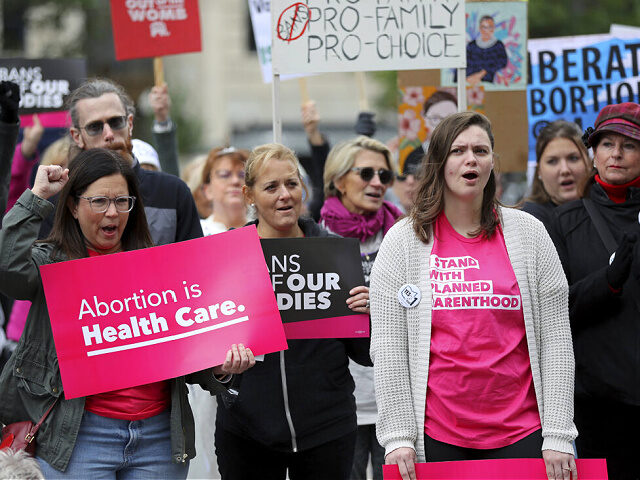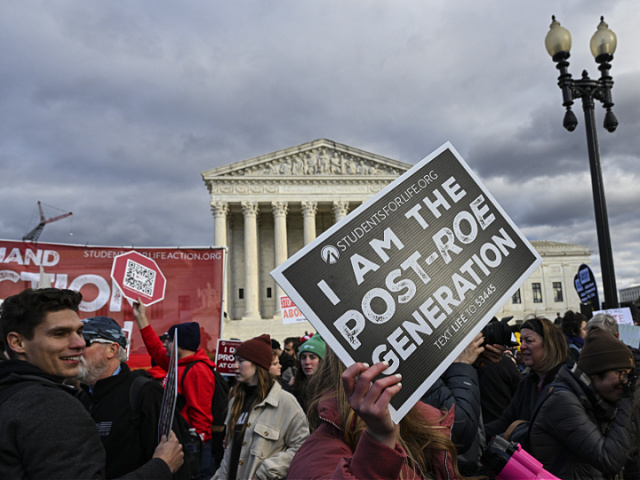
Seventeen Republican-led states are suing President Joe Biden’s Equal Employment Opportunity Commission (EEOC) for forcing employers across the United States to accommodate workers’ abortions.
Attorneys general filed the lawsuit on Friday following the EEOC’s decision to includeabortion in the Pregnant Workers Fairness Act (PWFA). The PWFA passed with bipartisan support in 2022 and did not include language about abortion. Instead, the law was created to allow reasonable workplace accommodations for pregnant and postpartum mothers such as time off and flexible breaks, unless the accommodation would result in an undue hardship for the employer.
“This is yet another attempt by the Biden administration to force through administrative fiat what it cannot get passed through Congress,” Arkansas Attorney General Tim Griffin said in a statement. “Under this radical interpretation of the PWFA, business owners will face federal lawsuits if they don’t accommodate employees’ abortions, even if those abortions are illegal under state law. The PWFA was meant to protect pregnancies, not end them.”
“The new rule, passed by a bare 3-2 majority of unelected EEOC commissioners, goes beyond what Congress authorized under the PWFA,” Griffin added.
When Congress passed the PWFA, it tasked the EEOC with issuing the rule and providing examples of reasonable accommodations. The EEOC’s final rule includes abortion in its definition of accommodating employees who have “limitations related to … pregnancy, childbirth, or related medical conditions” and applies the rule to public and private businesses with 15 or more employees.
The EEOC claimed that the final rule “does not require any employee to have — or not to have — an abortion, does not require taxpayers to pay for any abortions, and does not compel health care providers to provide any abortions. The PWFA also cannot be used to require an employer-sponsored health plan to pay for or cover any particular item, procedure, or treatment, including an abortion.”

Pro-abortion demonstrators rally to mark the first anniversary of the Supreme Court ruling in the Dobbs v Women’s Health Organization case in Washington, DC, on June 24, 2023. (ANDREW CABALLERO-REYNOLDS/AFP via Getty Images)
“Given these limitations, the type of accommodation that most likely will be sought under the PWFA regarding an abortion is time off to attend a medical appointment or for recovery. The PWFA, like the ADA (Americans with Disabilities Act), does not require that leave as an accommodation be paid leave, so leave will be unpaid unless the employer’s policies provide otherwise,” the agency clarified.
Attorneys general argue in the lawsuit that the inclusion of abortion in the PWFA goes against the explicit intent of the legislation, which had a “pro-family aim.” The lawsuit points to statements from both Democrat and Republican lawmakers before the PWFA’s passage acknowledging that the law was not designed to include abortion and that the EEOC should not use its influence to include abortion in the law’s application.
For example, Sen. Bob Casey (PA), a Democrat and a sponsor of the PWFA, said: “under the (PWFA), the EEOC could not — could not — issue any regulation that requires abortion leave, nor does the act permit the EEOC to require employers to provide abortions in violation of state law.”
Plaintiffs also allege that their states are facing irreparable harm because of the EEOC’s inclusion of abortion and argue that they will have to “facilitate workers’ abortions or face federal suit — even those elective abortions of healthy pregnancies that are illegal under state law.”
“Despite the outpouring of opposition, EEOC’s Final Rule includes a mandate that employers — including in States where abortion is generally prohibited — provide abortion accommodations to their workers. … EEOC’s Final Rule requires accommodating all abortions — even those performed exclusively to end a healthy pregnancy and terminate an unborn child’s life,” the complaint reads.

Pro-life supporters march in Washington, DC, on January 20, 2023. (Celal Gunes/Anadolu Agency via Getty Images)
Ultimately, attorneys general are alleging that the rule violates that the Administrative Procedure Act (APA) because the abortion mandate “exceeds the agency’ statutory authority.” They are also arguing that the rule is arbitrary and capricious, violates the the rules of federalism, state sovereignty, the First Amendment, and separation of powers.
The lawsuit further alleges that the EEOC underestimated how much abortion accommodations will cost public and private businesses and “failed to acknowledge that First Amendment protections sweep beyond religious organizations to all employers with religious objections, creating a potential free-exercise problem.” The complaint also argues employers will be unable to deny the use of paid leave for abortions if they generally allow employees to use paid leave for other reasons.
Attorneys general estimate the rule encompasses roughly 117 million employees of private employers, 18.8 million state and local government employees, and 2.3 million federal employees.
The states suing the EEOC include: Arkansas, Tennessee, Alabama, Florida, Georgia, Idaho, Indiana, Iowa, Kansas, Missouri, Nebraska, North Dakota, Oklahoma, South Carolina, South Dakota, Utah, and West Virginia.
The case is Tennessee et. al v. EEOC, No. 2:24-cv-84-DPM in the U.S. District Court for the Eastern District of Arkansas.
No comments:
Post a Comment